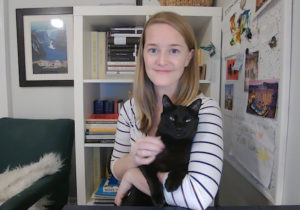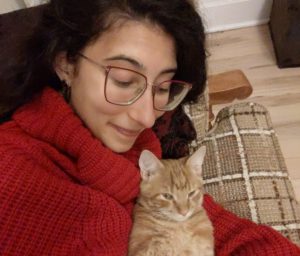“Mute your mic” is a common piece of corporate Zoom etiquette advice. But it’s not one Foundation Year Program Faculty Fellow Catherine Fullarton encourages.

Catherine Fullarton, FYP Fellow
Fullarton, who is currently living with family in Ontario while teaching at King’s, says the first time she meets students over Zoom she encourages them to “please keep your camera on. Please use the gallery view because it’s really nice to imagine we are all here together. And also, if you feel comfortable, just leave your mic on, because you won’t have to worry about unmuting and it allows a dynamic conversation to evolve.”
Foundation Year Program, or FYP, is an intensive inter-disciplinary program that introduces students to some of the great philosophical and literary works of the past 2,500 years. The program is a mix of lectures and tutorials, the latter led by FYP Fellows. This year, the lectures are asynchronous—meaning students can watch them online anytime—while the tutorials are synchronous.
Tutorials meet several times a week and embrace an attitude of mutual discovery. So instead of carefully formulating questions ahead of time, Fullarton said she encourages a safe environment so students “can discover their ideas by articulating them.” To that end, the University has also reduced the size of tutorials this year—down to 10 students from 15—and increased the number of tutors, all to make participation in the online environment easier.

Hilary Ilkay, FYP Fellow
Faculty Fellow Hilary Ilkay says online teaching can encourage informality—and it’s an equalizer too. “In a regular tutorial, you wouldn’t see students with blankets draped over them. Maybe it’s cold; I get it,” she said. “But I also wouldn’t have two kittens running over my head during a tutorial. It puts everyone on this weird level playing field, where none of us wants to be doing this in our home, but here we are doing it. So, throw your duvet on if that makes you feel comfortable. That’s fine.”
Fullarton said she’s used interruptions by pets as a way to build intimacy with students. “My cat walked into the background the other day and derailed the conversation,” she said. “Then we did a poll of how everyone’s pets were doing. I usually show up a few minutes early and open the room so they can be here before we get started, and now we sometimes use those first five minutes to ask how our pets are doing.”
Like Fullarton, Faculty Fellow Hamza Karam Ally is teaching from Ontario. Connecting with others over Zoom is “a shared experience, but also a very singular experience,” he said. “What can I do to make sure this is a welcoming space and not just another hour in front of your computer?”

Hamza Karam Ally, FYP Fellow
The job is made easier, he added, by students’ openness to online learning. He said, “I was surprised from the outset by how quickly students adapted to this new world. As instructors, we had the summer to prepare, to the extent that we were able… So I was so impressed and grateful for the way that students just took it on as ‘this is the way things are, and we’re going to make the best of it.’”
Attitudes are important, but instructors also have to learn new facilitation skills. “When you’re in a room with other people, your peripheral vision is doing a lot of work for you,” Fullarton said. “Zoom cuts out a lot of that embodied information. It demands a different kind of focus. I try to scan the Zoom room and make sure I’m managing to see if people are itching to say something.”
While connecting with students is important, connections among faculty are also part of the FYP experience. Ally said “there’s something about the feeling of a sense of physical proximity” to fellow faculty and staff that he sometimes misses. But he said he and fellow faculty do make time to connect online.
“One of the great things about the foundation year is that it’s not a fend-for-yourself type of program at all. We’ve got chat groups and sort of a weekly virtual get together. People check in on each other, and that has been very helpful,” he added. “Foundation year has a centre, and you always feel your connection to that centre.
Ilkay sees it the same way. “The King’s community and campus are such an integral part of what makes this job incredible. Last year, after a lecture, I would go chat with my fellow tutor friends—all of our offices are near each other—and that sense of camaraderie is hard to give up,” she said. “But [being online] has made me more conscious of staying in touch and checking up on people. So that has been a gift in itself, because I feel as close to my colleagues as I ever have. We’ve been able to create a community for ourselves, too. It is super-important that we not just focus on fostering community with our students, but that we also support each other as tutors.”
Banner photo by Magalie L’Abbé

